Just when you thought you had mastered the Google ranking-factors, it throws another curveball your way. The curveball I’m referring to is topical authority.
Now, many of you have probably put a laser focus on certain ranking factors such as backlinks and keywords, and rightfully so. These factors remain extremely important for the success of your website.
However, it is becoming plainly apparent that topical authority is evolving into one of the most important ranking factors out there, while backlinks are no longer the ranking powerhouse. Whether you’re an affiliate marketer or a company the most successful affiliate sites use this technique to rank higher and make more sales and conversions.
If you’re wondering what topical authority is and how you can implement it for your own site, keep reading. I’ll break down topical authority and show you the sites that are getting it right, so see how to implement this important factor.
What is Topical Authority?
Before we get too deep into this topic, let’s look at a definition of topical authority:
Topical authority refers to a high level of expertise within a given niche demonstrated by providing a significant amount of in-depth content within that niche.
That may be a wordy way to explain it but simply put, topical authority means you’ve found a specific niche and created lots of detailed content relating only to that niche. The trickiest part is finding a niche that fits the bill.
I’m sure you already know how important it is to find a niche but have you narrowed it down enough? That’s a question I will be addressed further in this post. For now, let’s talk about what topical authority actually looks like.
To start, a site with topical authority will be well within a specific niche. Now, I’m not talking about an overarching category. For example, you may want to be in the fitness niche. I would say that this niche is way too broad for you to gain topical authority in.
Think about it– how many sub-niches can fit under the umbrella of fitness? There are home workouts, supplements, gym memberships, weight lifting, diet plans, weight loss– and that’s just the tip of the iceberg.
Choosing the right niche is the biggest step before you start your blog or website.
The point I’m hammering in is that you need to pick a niche that is specific enough that you can become the leading voice on that topic. Now, picking the right niche is only part of gaining topical authority. You also need to make the right type of content and organize it correctly. I’ll cover these points later in this post.
Why Topical Authority is Important for Your Site
So, now you’re probably asking, why is this so important for my site? The answer is simple: without topical authority, all of your hard work may be going to waste. I’ve seen sites with consistently large numbers of organic traffic, excellent keywords, and tons of backlinks, begin to lose traffic because they aren’t considered a niche authority.
The reason for this is that they’ve chosen a niche that’s simply too broad. Even if you’re creating detailed, long-form content, without that niche, Google will no longer see you as an authority. Without that authority, you’re losing potential traffic.
Let’s talk a little bit more about the role that Google plays in topical authority. As I’m sure you know, Google looks at a number of ranking factors and uses them to rank your site.
Obviously, keywords play an important role here. You need to include the correct keywords in order to reach the target audience, gain leads, and make conversions.
Backlinks are another way to lead the target audience to your content. Traditionally, many people have focused on building a healthy backlink profile in the hopes to increase Google ranking.
This strategy has long been considered one of the best ways to improve your ranking, and for good reason. It has shown to be an actionable way to gain valuable leads and a signal to Google that your content is significant. More recently, there is increasing evidence suggesting that backlinks are no longer the powerful tool they once were.
Now, what most people do not realize is that topical authority is quickly making its way to the forefront of Google’s ranking factors. Although it’s not explicitly stated that topical authority is a top-ranking factor, Google’s very own SEO Starter Guide states this:
“A site with a good reputation is trustworthy. Cultivate a reputation for expertise and trustworthiness in a specific area.”
That sounds familiar, right? Google is telling us in a fairly straightforward way that cultivating expertise in a specific niche is important!
This is demonstrated in the decline in organic traffic at broad niche websites, and the growth in organic traffic at sub-niche websites, regardless of the number of backlinks.
This metric is a great example of what I’m talking about:
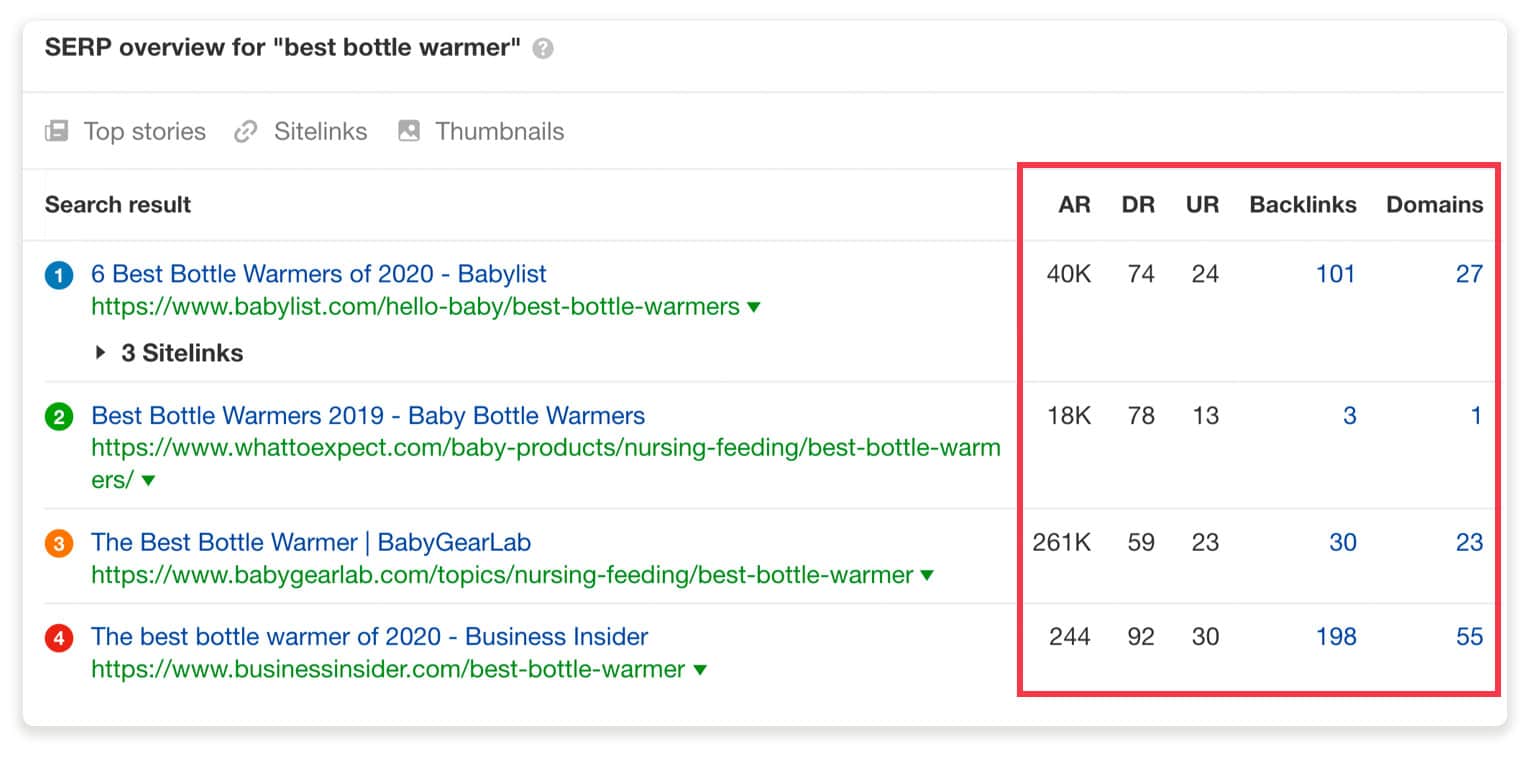 Take a close look at the SERPs for the keyword ‘best botter warmer’.
Take a close look at the SERPs for the keyword ‘best botter warmer’.
You’ll see that that fourth result has 198 backlinks, 55 referring domain, and Domain Rating of 92.
Now, according to popular belief in the SEO community regarding backlinks, the fourth site should be at the top of this list, hands down.
What’s even crazier, is that it’s beaten by a page with only three backlinks. So, what’s the deal? Well, that site with 198 backlinks is from Business Insider, while the site with three backlinks is from WhatToExpect.
WhatToExpect is a website dedicated to new parents, infants, and toddlers. They are regarded as the most trustworthy pregnancy and parenting brand around. On the other hand, we have Business Insider… a finance and business website.
So, which one has more topical authority? Clearly the answer is WhatToExpect. Further proving this point, are the other two sites outranking Business Insider with far fewer backlinks– both dedicated to infants, toddlers, pregnancy and parents.
So, let’s take a look at the websites that are doing it right, and the websites that are falling to the wayside.
Examples of Sites with Topical Authority
Labrador Training HQ
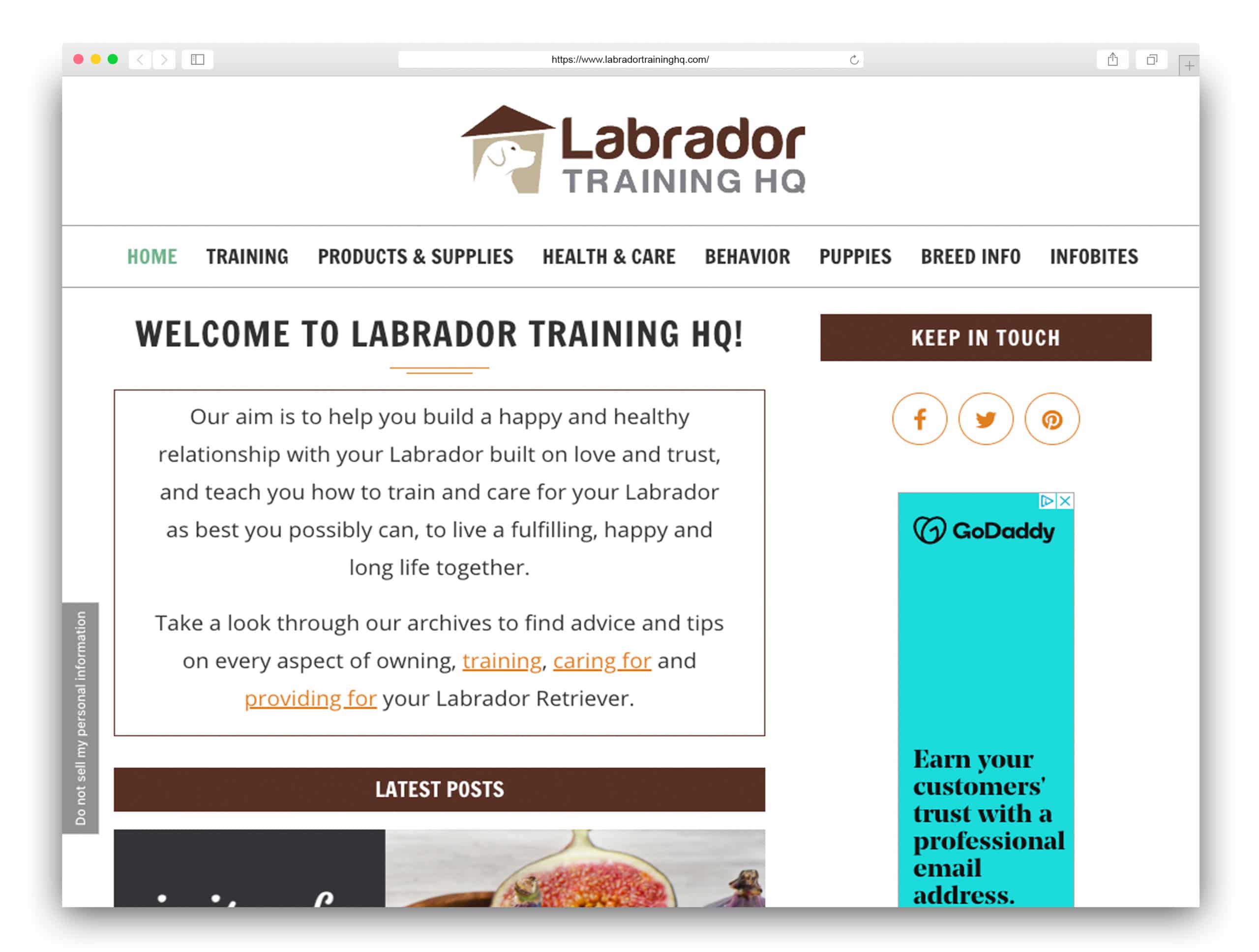
https://www.labradortraininghq.com
Description:
Labrador Training HQ is a niche website that covers topics related only to Labrador Retrievers, training and caring for this breed. They write about behavior, products, supplies, and general breed info. The creators of the site have this to say:
“LabradorTrainingHQ was started with the mission to create a comprehensive and exhaustive online resource for Labrador Retriever pet owners worldwide.”
They’ve set out to provide a comprehensive selection of content relating to Labrador retrievers, and I can confidently say they’ve successfully met this goal.
How this site gains topical authority:
The first thing we want to look at here is the niche. Now, obviously, it’s part of the pet niche. What we don’t see is a site dedicated to pets in general. In fact, we don’t even see a site dedicated to dogs.
No, what we see is a site dedicated to Labrador retrievers. See how specific that is? They’ve taken a profitable niche, narrowed it down to a single type of pet, and then narrowed down further to a single breed of dog.
You might see this and think this site is ruling out potential traffic by focusing on one single breed. Well, I’m here to tell you that you couldn’t be further from the truth. The fact is, the best way to gain organic traffic is to target the audience who is truly interested in your content.
The best way to do this is not to write a collection of singular posts stuffed with keywords. The best way to reach your audience is to dedicate your entire site to that topic.
This is not to say you can’t talk about other dog breeds down the road, but it helps your establish clear authority in one space.
Consider this– if you’re looking for the best training techniques for Labrador retrievers are you going to click on pets.com or are you going to choose Labrador Retriever HQ? The answer should be obvious.
You increase your chances of catching the attention of a much wider segment of your target audience by giving yourself that topical authority.
Mexico In My Kitchen
![]()
https://www.mexicoinmykitchen.com/
Description:
My next example is the epitome of topical authority and has the success to show for it. Mexico In My Kitchen is a niche blog dedicated to homestyle, authentic Mexican recipes. Again, we see a narrowing down of a broader niche.
Instead of a recipe website that features any and all recipes, we see a site dedicated to Mexican recipes. This site takes it even further by focusing on homestyle, authentic Mexican recipes.
The owner of this site is a Mexican woman who identifies as a home cook. She started the site in order to pass on these important recipes and has since seen an incredible amount of traffic to her site. In her own words:
“Our meals are traditional home-style meals from across México with a great influence from the following states: Tamaulipas, Nuevo León, Veracruz, Puebla, Estado de México, Tabasco, and Yucatán. These are all places that I used to live.”
Taking a closer look at the numbers, Mexico In My Kitchen is absolutely killing it in organic traffic. This traffic is reflected in the robust comment section under many of the blog posts. Visitors are engaging with the site and discussing the recipes.
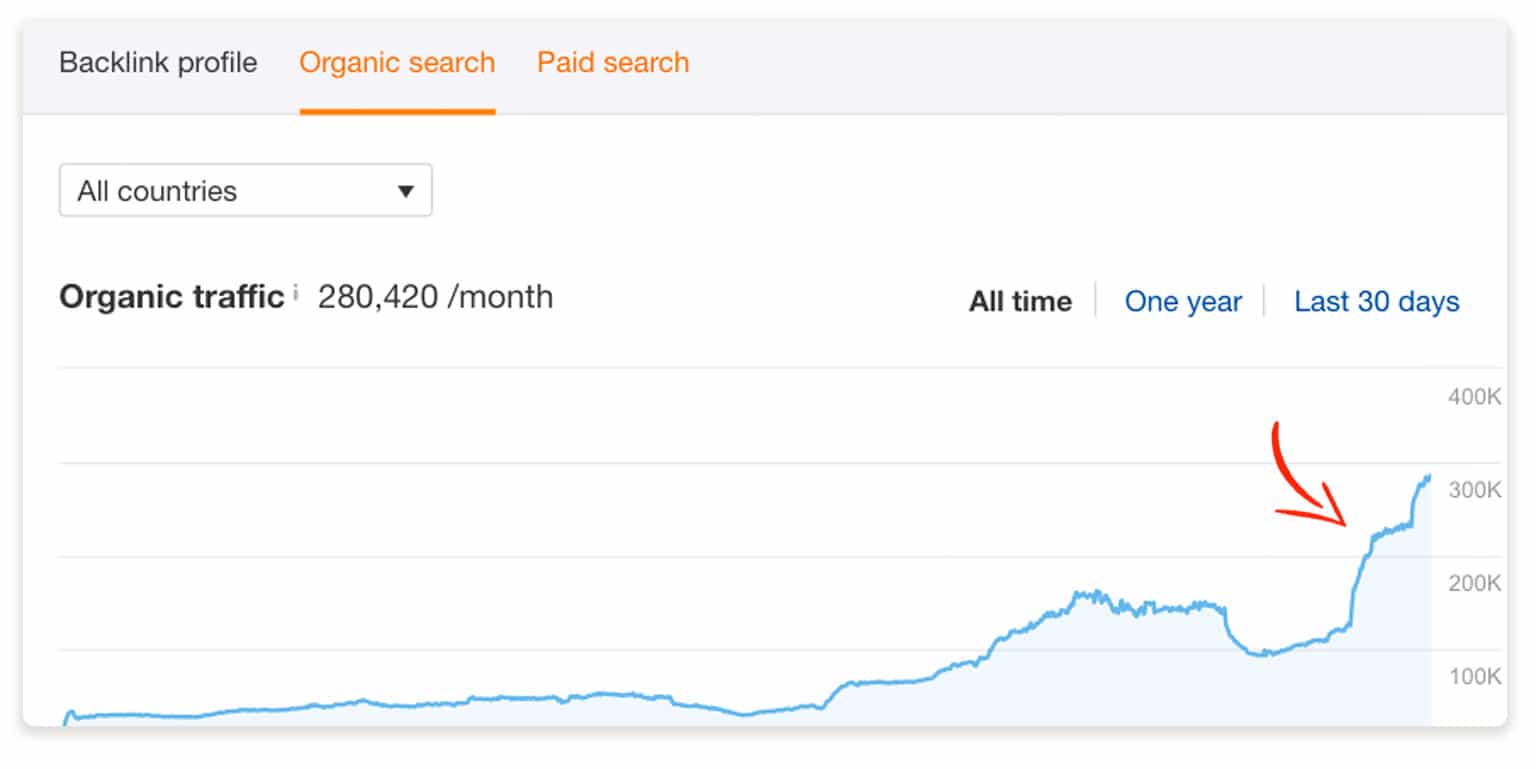 We can see that even though they took a dip in August of 2019 which could have been related to any other ranking factor, the overall trend of this site is upward.
We can see that even though they took a dip in August of 2019 which could have been related to any other ranking factor, the overall trend of this site is upward.
Make no mistake, this site is consistently ranking high on SERPs not only for its use of keywords but because it is clearly a topical authority on Mexican recipes. These high traffic rates only further prove this point.
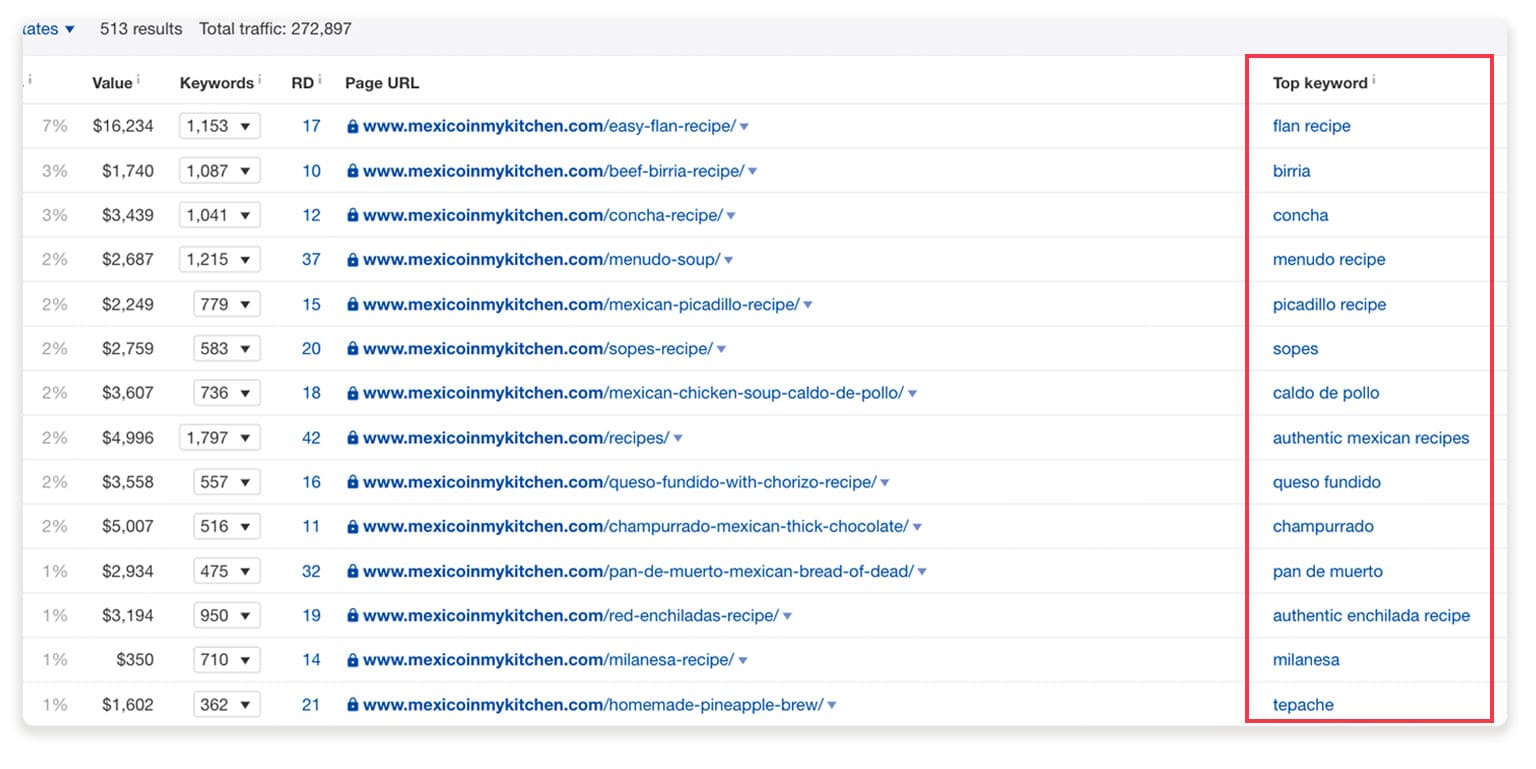
How this site gains topical authority:
One thing that I’d like to point out here is that the founder of the site is, in fact, an authority on the topic she covers. She is a Mexican, homestyle cook, writing about Mexican homestyle cooking. I say this to emphasize the importance of credibility.
If the audience perceives you as an expert, this gives you an automatic boost in the realm of authority. Now, aside from this, Mexico In My Kitchen has done a great job of narrowing down its niche.
Like I’ve already mentioned, this site is under the large, profitable umbrella of cooking and recipes, but with a very specific focus.
Next, the site provides in-depth content. Each blog post includes a short story about her connection to the dish, expert tips, and of course, a detailed recipe with measurements and instructions.
The posts also include beautiful images to showcase the food. I want to point out the quality of the content because Google looks at how relevant each page is to a given niche as well as the entire site as a whole.
In the case of Mexico In My Kitchen, it’s all related to homestyle Mexican cooking, providing a comprehensive collection of recipes and thus becoming a topical authority. Example of a Site Without Topical Authority
We’ve looked at two sites that show exactly what topical authority looks like. Now, let’s look at a site that is the opposite of topical authority.
Best Seven Reviews

https://www.bestsevenreviews.com
Description:
Best Seven Reviews provides reviews on a wide variety of topics. Each review is a list of the “best seven” in that given category.
For example, one of the articles currently featured is called “Best 7 Fujifilm Cameras in 2019.” This site covers topics including technology, software, gadgets, and lifestyle.
Aside from the top seven reviews, the site also includes how-to’s, and coupon codes.
Why this site is not a topical authority:
If you’ve been paying attention, then one major factor is going to stand you to you right now. This site has no focus! While it is loosely based on tech-related topics, it covers a huge array of topics.
Rather than focusing on a very specific niche, this site focuses on a post-type, which is top-seven style reviews. Unfortunately, this does not translate into a niche. On top of that, the site even diverges from the top seven reviews with how-to articles and coupon lists.
As a result, Google and users have a hard time identifying which topic this site should have authority in, resulting in high traffic volatility and ultimately a downward trend.
As you can see from the screenshot below, bestsevenreviews.com dropped from about 7.6 Million organic monklty visitors per month to about 1.9 Million.
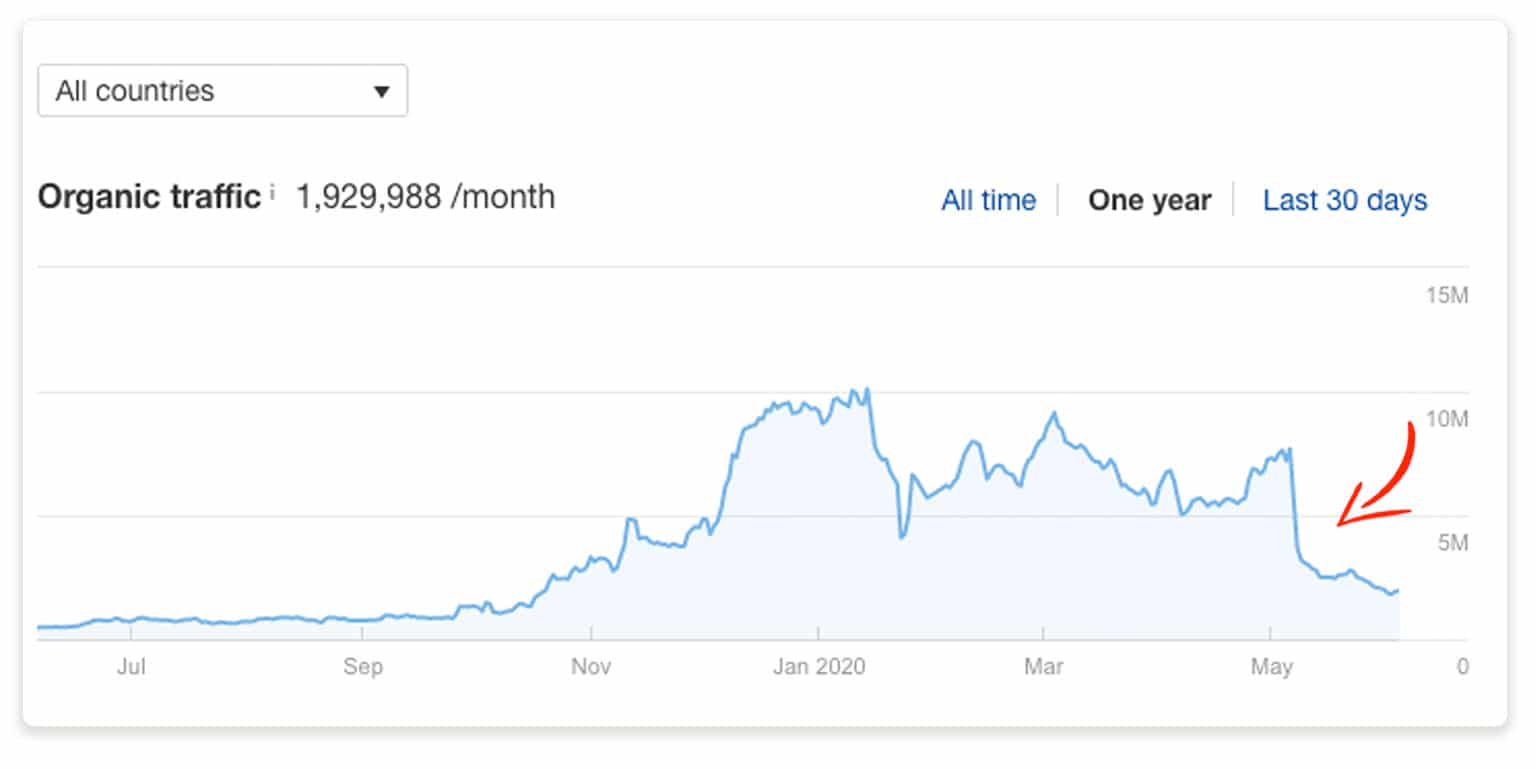
Now, I used this site as an example because there is a lot to learn here. The site actually does a great job in many respects. If you take a look at the content, the articles are long, well-researched, detailed, and make good use of keywords.
Moreover, this site has 121k referring domains and Domain Authority of 86.
Better yet, they’re breaking down complicated, technical topics into an easy to understand format. I point all of this out to demonstrate that while in-depth content is important, without focus, your hard work may go to waste.
If you search “best seven Fujifilm cameras” the top results are all for sites dedicated to digital photography and cameras. The Google algorithm is simply not going to rank a site dedicated to general reviews on this very specific topic.
This site is so general, I’m not even sure I can truly identify a niche. By focusing on “reviews” as the topic instead of a well-defined niche, the site loses all topical authority.
Of course, a significant effect of failing to choose a niche is that the target audience is lost. Who is this site targeting? It’s loosely focused on tech, but at the end of the day, the focus is lost in the large number of articles focusing on separate subjects.
How can you learn from this? You absolutely need to focus on a niche. You probably need to refine your niche even further than you expect to.
Defining your niche should be the first item on your to-do list. This allows you to reach your target audience and it signals to Google that your site offers value to your field.
How Can You Gain Topical Authority?
The big question– how can you earn topical authority for your own site? We’ve looked at excellent examples of sites who have achieved topical authority, and one example of a site that has not utilized topical authority.
Now, I’ll break down how you can become a leader in your niche and rank higher on a search results page.
1. Choose a very specific niche: By now, you have probably picked up just how important it is to choose a niche. And I’m not talking about an overarching niche like “fitness” or “gardening I’m talking about a well-defined niche within a profitable, larger niche.
Some examples are “vegan bodybuilding” or “cottage gardens.” These examples both fall within a larger niche but cover a very specific segment of said niche.
I can’t state how important this step is, so I’ve dedicated a section of this post specifically to help you choose a niche. You can find that below.
2. Write in-depth content: I’ve mentioned this before, but it plays an important role in topical authority.
Content depth is a ranking factor that, paired with a specific niche, brings a lot of credibility to your site. To get an idea of what content depth is, I’ve pulled a quote from Market Muse:
“In-depth content is designed to meet a reader’s needs with expert knowledge on a variety of related subjects around a focus topic.”
From this quote alone, you can see how closely content depth is related to topical authority. The first thing to be aware of when it comes to content depth is that length does not equal depth.
Yes, it’s true that long articles are more likely to have more depth, that’s not always the case. You can find plenty of examples of articles well over 2000 words that are more or less, stuffed with filler.
Content depth focuses on providing well-researched, detailed, data-driven content. Your content should be answering real questions posed by the target audience.
3. Implement topic clusters: Lastly, in addition to picking a niche and implementing content depth, your goal should be to create topical authority for your entire site as a whole.
A common mistake that’s made by content creators is to focus on keywords and optimizing individual pages with little regard for how the site works as a comprehensive unit.
Topic clustering is a technique that allows you to organize your site in a way that showcases cohesive content. A site that can demonstrate this is automatically more authoritative.
You can use content clustering on an existing site by auditing your site and categorizing the content that is related. For each sub-topic, you’ll want to create a pillar page where all of the related content is displayed.
This is a great way to further define all of the categories within your small niche, organize your site, and rank higher on Google.
How to Use Links to Gain Topical Authority:
Although backlinks may not be quite as powerful as they once were, links play an important role in how your site ranks. Here are some tips for using links when building topical authority:
Don’t be afraid of internal links: The bottom line is this– Google does not penalize sites for using gratuitous internal links, as long you’re using diverse anchor text.
Obviously, you should not go and put hundreds of internal links in your post with stuffed anchor text. However, if you’re putting several internal links in your posts in a reasonable manner, you have nothing to be worried about.
Plugins like LinkWhisper make it easy you build internal links by suggesting related pages from content you have already written. It also shows you which of your page are “orphan” or have little to no links.
Internal links provide an easy way for your audience to navigate your site, and if your content is all inter-related, this is an incredibly useful tool for increasing audience engagement.
Remember to use the correct anchor text since this is how Google determines what the page is about.
Gain backlinks from related sites: I won’t spend a lot of time here but just know, the most powerful backlinks you can earn are from related sites with topical authority.
I would rather get a backlink from a small site that has topical authority than a major site that is unrelated to my niche.
How to Choose a Niche for Your Site
We’ve talked a lot about the importance of a good niche in the post, so let’s go over how to define a niche for your site. Whether you’re starting a blog or creating a YouTube channel, it’s important to create content that closely relates to your chosen topic. Here’s how you can pick a niche and refine it:
1. Pick an overarching niche: The first step is to find a profitable niche that you’re interested in. There are tons of great options including pets, technology, education, and fitness.
Whatever it is you choose, make sure it meets your needs. If you’re in affiliate marketing, are there sufficient affiliate programs to choose from within your niche? Are a significant number of people searching for related keywords in a given month?
These are questions you should be thinking about.
2. Narrow it down to a single sub-topic: After identifying a profitable niche, you likely need to narrow down further.
Unless you’ve chosen a very specific topic, most profitable niches are already highly saturated.
This means you need to take that topic, pick a sup-topic, and create a substantial amount of content relating to it.
3. Increase your topics slowly over time: Once you create topical authority on your narrow niche, you can slowly increase your topical range.
Only after you’ve gained topical authority should you start including other topics. As you begin expanding remember to use topic clusters to keep your site organized.
Final Thoughts:
Gaining topical authority is an incredibly important ranking factor. The good news is, it’s actually an achievable goal. Unlike building a backlink profile, which is fairly tedious work, gaining topical authority is the natural result of focusing your site on a niche.
Make sure to really narrow down that niche and write quality in-depth content. As your site grows, you should be implementing topic clusters to maintain the overall cohesiveness of the site.
Topical authority is something you should always keep in mind whenever you start a site, and as you move forward with your existing sites.
